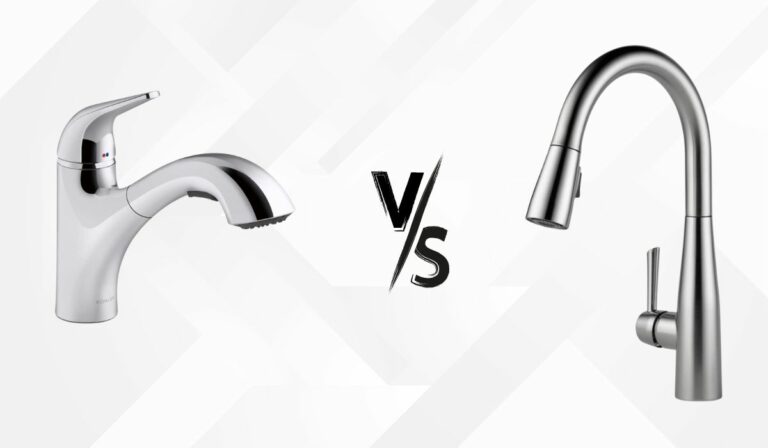Is a Water Heater an Appliance
You can consider a water heater an essential household appliance since it provides hot water for daily tasks like bathing and cleaning. It uses energy—electricity or gas—to heat and deliver water through your home’s plumbing. While often installed permanently, it still fits the appliance category because of its function and utility. Understanding this helps you maintain it properly and keep your home safe. Keep exploring to see how it compares to other home devices and fixtures.
Defining Household Appliances
What exactly qualifies as a household appliance? You’ll find that appliances are devices designed to perform specific tasks around your home, making daily activities easier and more efficient. Typically, they use electricity, gas, or other energy sources to function.
Think about your refrigerator, microwave, or washing machine—each serves a clear purpose and helps maintain your household’s comfort and convenience. Appliances are usually durable and built for regular use.
They differ from simple tools or gadgets because they often require installation or connection to utilities. When you consider whether something counts as an appliance, ask if it’s an essential, functional device intended for common household chores or maintenance.
This understanding sets the stage for figuring out where a water heater fits in.
The Role and Function of Water Heaters
Understanding what makes a device an appliance helps clarify the place of water heaters in your home. Water heaters play a vital role by providing consistent hot water for daily activities like bathing, cooking, and cleaning. They work by heating cold water and delivering it through your plumbing system whenever you need it.
Without a functioning water heater, your comfort and hygiene routines would be significantly disrupted. You rely on this device not only for convenience but also for safety, as it ensures water reaches a temperature that kills harmful bacteria.
Classification of Water Heaters in Home Systems
Although water heaters come in various styles and technologies, they all fall into specific categories based on how they heat and store water. You’ll mainly find two types: storage tank water heaters and tankless water heaters. Storage tanks hold a ready supply of hot water, heating it continuously, so you have immediate access when needed.
Tankless heaters, on the other hand, heat water on demand, saving space and energy since they don’t store water. Additionally, water heaters classify by their energy source—electric, gas, or solar-powered models. Each type suits different household needs and budgets, so understanding these categories helps you choose the right system for your home.
Differences Between Appliances and Home Fixtures
Knowing how water heaters are classified helps when deciding if they fit into the category of appliances or fixtures in your home. Appliances are usually movable devices designed to perform specific tasks, like cooking or cleaning. You can unplug or replace them without major changes to your home.
Fixtures, on the other hand, are permanent parts of your house, such as sinks or built-in cabinets, often requiring professional installation or removal. Water heaters blur these lines because, while they serve a distinct function and rely on energy, they’re typically installed permanently and connected to your plumbing system.
Why Knowing Appliance Status Matters for Maintenance and Safety
Because water heaters straddle the line between appliances and fixtures, it’s crucial to recognize their classification for proper maintenance and safety measures. When you know whether your water heater is considered an appliance, you can follow manufacturer guidelines and schedule timely inspections. This helps prevent breakdowns and extends its lifespan.
Also, proper classification affects how you handle repairs—appliances might require specialized technicians, while fixtures need different expertise. Understanding its status ensures you use the right safety precautions, preventing risks like leaks or electrical hazards.
Ultimately, knowing your water heater’s classification empowers you to maintain it correctly, avoid costly damages, and keep your household safe. So, don’t overlook this detail—it’s essential for effective upkeep and peace of mind.
Frequently Asked Questions
How Much Does a Typical Water Heater Cost to Install?
You can expect to pay between $800 and $1,500 to install a typical water heater, depending on the type, size, and labor costs in your area. Tankless models usually cost more upfront but save energy.
What Is the Average Lifespan of a Water Heater?
You can expect your water heater to last about 8 to 12 years, depending on the type and maintenance. Regularly flushing and checking the anode rod can help extend its lifespan and keep it running efficiently.
Can a Water Heater Be Repaired or Should It Be Replaced?
You can repair a water heater if the problem is minor, like a faulty thermostat. But if it’s old, leaking, or has major issues, you should replace it to avoid costly repairs and inefficiency.
Are There Energy-Efficient Water Heater Options Available?
Yes, you’ll find energy-efficient water heaters like heat pump models and tankless systems. They use less energy by heating water on demand or transferring heat, saving you money and reducing your environmental impact over time.
How Often Should a Water Heater Be Inspected or Serviced?
You should have your water heater inspected and serviced at least once a year to ensure it runs efficiently and safely. Regular maintenance helps prevent issues and extends the unit’s lifespan, saving you money in the long run.
Conclusion
Now that you know a water heater is indeed an appliance, you can better understand its role in your home. Treating it as an appliance means you’ll prioritize regular maintenance and safety checks just like you would with your refrigerator or oven. This awareness helps you keep your water heater running efficiently and prevents potential hazards. So, remember to inspect and service it regularly to ensure comfort and safety in your household.

